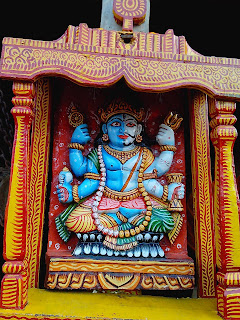Rathe tu Vaamanam drustva
We have heard a very popular sloka that is as
follows –
Rathe tu Vaamanam drustva Punarjanmam na
vidyate ||
It means if we see Vaamana or Lord Jagannath on
the Chariot during the Rath Yatra or the Car festival, we will never have to
take rebirth again. In other words, we will get salvation or moksha or
liberation from the cycle of birth and death.
But a question comes to our mind that why Lord
Jagannath is described here as ‘Vaamana’?
To know the answer we have to refer to the
following sloka –
मधुसूदनो वैशाखे ज्येष्ठे त्रविक्रमः पतिः।
आषाढे वामानाधीशः श्रावणे श्रीधरः स्मृतः॥
भाद्रवे हृषिकेशश्च पद्मनाभोऽश्विनाधिपः।
दामोदरश्च कार्त्तिके मार्गशीर्षे च केशवः॥
पौषे नारायणस्वामी माघाधिपश्च माधवः।
फाल्गुने गोविन्दो ज्ञेयो विष्णुश्चैत्रेश्वरोऽपिच॥
आषाढे वामानाधीशः श्रावणे श्रीधरः स्मृतः॥
भाद्रवे हृषिकेशश्च पद्मनाभोऽश्विनाधिपः।
दामोदरश्च कार्त्तिके मार्गशीर्षे च केशवः॥
पौषे नारायणस्वामी माघाधिपश्च माधवः।
फाल्गुने गोविन्दो ज्ञेयो विष्णुश्चैत्रेश्वरोऽपिच॥
It means the combination of Hindu months and
their presiding deities are as follows -
वेशाख-मधुसूदन, ज्येष्ठ - त्रिविक्रम , आषाढ़ - वामन , श्रावण-श्रीधर , भाद्रव- हृषीकेश , आश्विन - पद्मनाभ , कार्तिक - दामोदर , मार्गशीर्ष - केशव , पौष - नारायण , माघ- माधव , फाल्गुन - गोविन्द , चैत्र - विष्णु॥
In English -
Vaishaakha-Madhusudana, Jyeshtha-Trivikrama,
Ashaadha-Vaamana, Shraavana-Sridhara, Bhaadrava-Hrushikesha,
Aashwina-Padmanaava, Kaartika-Daamodara, Maargashirsha-Keshava,
Pousha-Naaraayana, Maagha-Maadhava, Phaalguna-Govinda and Chaitra-Vishnu ||
These deities are the twelve different forms of
Lord Vishnu. Now let us get back to the sloka – ‘Rathe tu’. Actually it is a
part of the following sloka –
Dole tu Dolagovindam Chaape tu Madhusudanam |
Rathe tu Vaamanam drustva Punarjanmam na
vidyate ||
It means, in Purusottama Kshetra or Puri, if
you see Dolagovinda in Dola Yatra, Madhusudana in Chaapa (Boating journey of
the Lords) and Vaamana in the Rath or Chariot during Rath Yatra or the Car
Festival, then you will get moksha or salvation or liberation from the cycle of
birth and death.
It is seen that Dola Yatra falls
during Phalguna and the presiding deity of this month is Govinda, Chaapa or
Chandan Yatra falls during Vaishaakha and the presiding deity of this month is
Madhusudana, and Rath Yatra falls during Aashaadha and the presiding deity of
this month is Vaamana.
So it gets clear that we get to see Vaamana form
of Lord Vishnu (Jagannath) during Rath Yatra as it falls during the month of Aashadha.
But again a question comes, why we get
liberation by just seeing Him during that time?
And the answer is - liberation or moksha can be
granted by Vishnu and Shiva. Also if you happen to take your last breathe in
either Varanasi (eternal abode of Shiva) or Puri (eternal abode of Vishnu), you
will be granted moksha or liberation by the grace of these two great Gods. That’s why
it is said that –
Gangaayam cha jale muktih vaaraanaasyam jale
sthale |
Jale sthale chantariksye muktih sri purusottame
||
It means you will get liberation if you take
your last breathe in the river Ganga or in the landmass/water bodies of
Varanasi or in the landmass/water bodies/aerial spaces of Puri (Purusottama
Kshetra).
Such is the glory and sanctity of Purusottama
Kshetra or Puri where Lord Jagannath (Vishnu) resides eternally and grants
moksha also to everybody who sees Him in Vaamana form during Rath Yatra.
Jai Jagannath!

Got cleared.Thanks.
ReplyDeleteBohuta sunder explanation. Thanks.
ReplyDelete